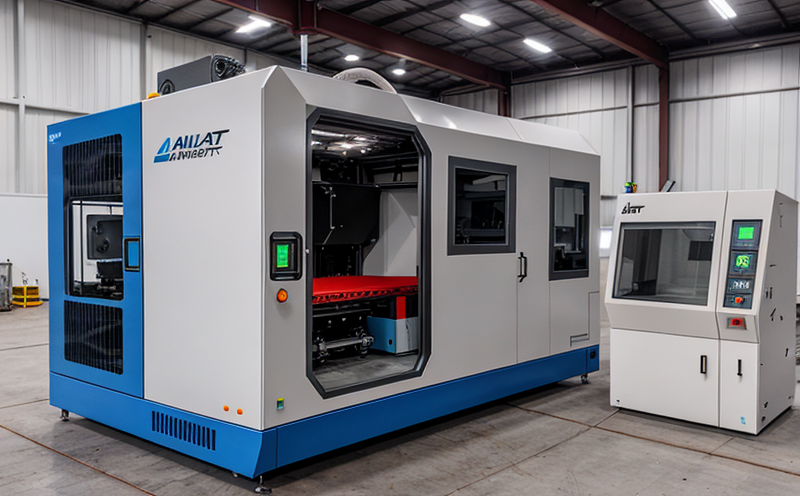ASTM F3091 Powder Bed Fusion Plastics Testing
The ASTM F3091 standard specifies the testing methods to evaluate the mechanical and physical properties of plastics used in powder bed fusion (PBF) additive manufacturing processes. This service is essential for quality managers, compliance officers, R&D engineers, and procurement specialists working with PBF technologies. The focus lies on ensuring that materials meet stringent performance requirements critical for end-product reliability.
The ASTM F3091 standard addresses the unique challenges of plastic powder processing in PBF additive manufacturing. Unlike traditional material testing, this process requires a comprehensive assessment of both raw materials and final products to ensure they withstand the high-pressure environments typical of PBF systems. The service encompasses various mechanical tests such as tensile strength, flexural modulus, impact resistance, and more.
One of the primary advantages of ASTM F3091 is its ability to provide a standardized approach to testing powder bed fused plastics. This ensures consistent results across different laboratories and manufacturing processes. By adhering to this standard, manufacturers can confidently validate their materials’ performance under real-world conditions.
The methodology for ASTM F3091 involves several key steps: material characterization, sample preparation, mechanical testing, and final analysis. Material characterization includes identifying the chemical composition of the plastic powder used in PBF processes. Sample preparation is critical to ensure that specimens accurately represent the properties of the raw materials. Mechanical tests are then conducted using precision instruments calibrated according to ASTM F3091 guidelines.
Throughout this process, it’s essential to maintain strict adherence to ISO 9001:2015 quality management systems and other relevant international standards to ensure accuracy and reliability in test results. This ensures that the data generated through these tests can be trusted by all stakeholders involved in additive manufacturing processes.
The ASTM F3091 standard is widely recognized for its comprehensive approach to evaluating PBF plastics, making it an indispensable tool for industries relying heavily on advanced manufacturing techniques. By leveraging this standard, organizations can enhance their product quality and maintain compliance with regulatory requirements.
Another key aspect of ASTM F3091 lies in its ability to help identify potential issues early in the development cycle. Through rigorous testing and evaluation, manufacturers can pinpoint areas where improvements are needed, leading to better overall performance and longer-lasting products.
Scope and Methodology
The ASTM F3091 standard covers a wide range of mechanical tests designed specifically for evaluating the properties of plastics used in powder bed fusion processes. These include tensile testing, flexural testing, impact testing, hardness testing, and more.
- Tensile Testing: Measures how much force is required to break a sample while it’s being stretched.
- Flexural Testing: Evaluates the bending strength of specimens by applying a load across their length.
- Impact Testing: Assesses the ability of materials to withstand shock loads or impacts.
- Hardness Testing: Determines the resistance of materials against indentation or scratching.
The standard also provides detailed instructions on how to prepare specimens for testing, ensuring that they are representative of the actual material being used in PBF processes. This preparation includes considerations such as surface finish, size dimensions, and orientation relative to the direction of force application during tests.
In addition to mechanical testing, ASTM F3091 also addresses non-destructive examination methods like optical microscopy and scanning electron microscopy (SEM). These techniques allow researchers to examine microstructural features that may influence mechanical behavior. By combining these advanced imaging tools with traditional laboratory analyses, a more holistic understanding of material properties can be achieved.
Finally, ASTM F3091 emphasizes the importance of reproducibility in testing results. The standard outlines specific procedures for calibrating equipment, training personnel, and controlling environmental conditions to minimize variability between tests conducted at different facilities or times.
Eurolab Advantages
At Eurolab, we offer unparalleled expertise in ASTM F3091 powder bed fusion plastics testing. Our team of experienced professionals brings years of industry experience to every project, ensuring accurate and reliable results that meet the highest standards.
We utilize state-of-the-art equipment calibrated according to international standards like ISO 9001:2015, ASME, and others. This guarantees precision in all measurements and analyses performed during testing procedures. Our laboratories are equipped with advanced instrumentation capable of handling complex samples typical of PBF processes.
Our commitment to quality extends beyond just technical capabilities; it includes attention to detail throughout the entire process—from initial consultation through final reporting stages. We work closely with clients to understand their unique needs and tailor our services accordingly, ensuring that every project receives personalized care.
In addition to meeting regulatory requirements, Eurolab also focuses on helping companies improve product quality by identifying potential weaknesses early in the development cycle. Our comprehensive testing approaches provide valuable insights into material performance under various conditions, enabling informed decisions about design changes or process modifications if necessary.
Use Cases and Application Examples
- Aerospace: Ensuring that plastic parts used in aircraft structures meet strict safety standards.
- Medical Devices: Verifying the biocompatibility and durability of components for implants or surgical tools.
- Consumer Electronics: Testing enclosures and housing materials to withstand vibration, shock, and temperature variations.
- Automotive Industry: Evaluating fuel tanks, bumpers, and other parts subjected to extreme conditions during manufacturing and use.
In each of these sectors, ASTM F3091 plays a crucial role in ensuring that materials perform reliably under harsh environmental conditions. By adhering strictly to this standard, manufacturers can produce products that are not only safe but also efficient and cost-effective throughout their lifecycle.





